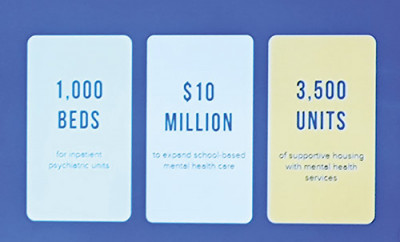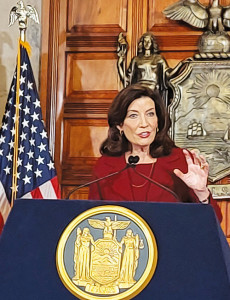
Three months ago, on a cold February day, Governor Kathy Hochul proposed a budget that totaled $227 billion. Even that amount seems like a lot of money to many of our readers. However, state lawmakers did not allow that number from slowing them down to add another $2 billion to the total before beginning debate on the nine bills that make up the spending plan. The $229 billion spending plan is an $8 billion increase over last year’s budget.
Each budget bill focuses on a different part of state government and each bill is approximately 1,150 pages. It was released publicly when the debate began at approximately 3 p.m. Monday, May, 1. The chairwomen of the budget committees in each house admitted they had not read the budget completely prior to the beginning of the debate. They relied heavily on the interpretation from their staff.
To put this in perspective, the state budget has ballooned by $60 billion in the past five years, eclipsing the total budgets of 35 other states. One lawmaker pointed out that California, with double the population of New York state, has a budget half the size of The Empire State.

Hochul had as a centerpiece for her proposed budget building 800,000 new housing units in 10 years. She allocated $250 million in this years’ budget to kick off the program.
“The housing compact is a very sensitive subject in my district, that is within 15 miles of NYC, with high expectations that were not communicated with local officials before the governor proposed them,” Senator Shelley Mayer (D – Yonkers, Westchester County) told The Jewish Link. “The fact that there were no prior conversations with elected officials as to why it was necessary to do this heavy-handed, one-size fits all approach, not enough discussion about affordability, which is really the issue in the suburbs. You can’t find an affordable apartment. Not enough conversation about rent for working people, which is the big issue for me. I think it was very misguided what she did but I understand the need to increase the supply of housing. Many of the communities I represent resent having someone supersede their zoning or environment review process and there is very strong opposition in my district.”
With such strong pushback from state lawmakers, Hochul removed the $250,000 she put into the budget when the plan went down in flames.
“I would guess that both sides of the aisle are equally frustrated about this story,” lamented Liz Krueger (D – Upper East Side), chairwoman of the Senate Finance Committee. “Budget bills were a combination of money amounts, policy amounts, dancing and theater. This is a group product and frankly I don’t think either house, either party could get their work done without having terrific staff who have spent countless hours over three months getting us to this point.”

Several Republican Senators bemoaned their loss of power in the upper house and repeatedly said, “This is not just a late budget, it’s a bad budget.”
One Republican New York City Senator summed up the budget as if he was writing an anti-Democratic television ad.
“It’s clear to me all you need to do is travel the state to hear the plight of New Yorkers. Crime is on the rise and has been for the last several years to the point where there are more robberies, burglaries and murders than there have been in many decades. New York is less safe than it’s been in many, many years. New York is less affordable [now] then it has ever been, certainly in my lifetime,” said Senator Andrew Lanza, 58, (R – Great Kills, Staten Island). “New York is less affordable. The tax burden here is higher than anywhere else in America. A lot of people are asking a very simple question. What are we getting for being the most taxed people in America? Sadly, the answer, more often than not, is not much. We see drug overdose deaths at historic levels. Thousand more people are dying in New York from Fentanyl and drug overdoses than they are from gun violence. That’s just a fact. We don’t see the governor calling any emergency sessions to deal with that and she should because that’s what people are living through here in New York. The reason we find ourselves in this condition in New York is because of budgets like this and because of budgets we’ve seen over the past several years.”
Even though this budget added $2 billion to the governor’s proposed budget and $8 billion over last year’s spending plan, some lawmakers did not feel the $229 billion spending plan reached every corner of the state, specifically citing some in “the vulnerable population did not get a fair shake.” Senate Republicans advocated for additional funding for the disabled. The Republicans called for an 8.5 % increase in the Cost-of-Living Adjustment [COLA] for human service agencies. When both one-house spending plans were rolled out last month, the 8.5 % COLA was in both documents. When it got to the negotiating table with the governor included, that 8.5 % was pushed down to 4 %, less than the 5.4 % allocated in last year’s budget.
“New York has continued to face a health care worker and direct care support professional shortage. Last year’s budget only increased the human services COLA by 5.4 % and provided $500 million in funding,” said Senator Bill Weber (R – Montebello, Rockland County), a CPA and ranking member on the Senate Disabilities Committee. “Those that care for the needs of vulnerable populations such as those impacted by disability or needing direct care support have the most needs for our help right now. It is our duty as legislators to serve all New Yorkers and this is the first step to look out for others. We need to increase the COLA so mental health, disability and other human services direct care work professionals have the ability and resources to help other people who need it the most and who continue to work and train to recruit others to dedicate their lives in this important field. Increase the pay for our hard-working human services non-profit providers.”
In the Assembly, rank-and-file Democrats and Republicans argued for additional money to be included in the mental health portion of the budget. However, with the die already cast, lawmakers could not do anything except make their voices heard and hope for better results on another day. One lawmaker made this a gender issue.
“I am disappointed in the increases for people who work in mental health units and in long-term care. As a registered nurse I worked on a mental health floor and worked in long-term care,” said Assemblywoman Aileen Gunther (D – Forestburgh, Sullivan County), 69, a nurse by profession and Chairwoman of Assembly Mental Health Committee. “It’s very hard to explain both the physical and the emotional energy that we put into our job. This increase will not attract more people to come to our long-term care to take care of people with mental hygiene and it is so imperative that we go back and think about it. These are mostly women working on the floor. It’s both physical and mental and it’s just not fair that we have to beg every year to get a living wage for people that provide care to people who are the most vulnerable. We can’t keep doing this. We have to pay them, mostly women, a living wage. If it were a man’s world it wouldn’t be like this. I’m horrified that we couldn’t do a better job.”
Some Assembly Republicans, especially first term lawmakers did not see a rational reason for having a late budget.
“Not only is this no way to run a government, successful businesses don’t run this way either. I’m not really frustrated because I anticipated nothing but total chaos and that’s exactly what I’ve gotten, total chaos,” Assemblyman Sam Pirozzolo, (R – Castleton Corners, Staten Island), a licensed optician who owns and operates Steinway Eye Care in Astoria, Queens, told The Jewish Link. “We couldn’t get this done since January? We know the looming deadline is coming. Seriously? We have to go through this? No one is being the adult in the room in my opinion from a business perspective.”
Pirozzolo said, “Instead of doing their (lawmakers) jobs when they had the opportunity to do their jobs everything is being kicked down the road and under the threat of not being paid, now flexibility begins. That’s a shame because when people make decisions under duress, they don’t make the best decisions and they tend to make decisions that benefit themselves personally and not necessarily their constituents.”
As expected, the governor’s reaction to the state budget was positive and was aimed at helping New Yorkers from one end of the state to the other.
“I promised New Yorkers we would make our state more affordable, more livable and safer, and this budget delivers on that promise,” Governor Kathy Hochul (D – Buffalo, Erie County) said. “This is a transformative budget that improves public safety, transforms our mental health care system, protects our climate and invests in our children’s future.”
The budget wrapped up on Tuesday, May 2, 32 days past the deadline. At least five other budgets in the past 25 years have been later than this one. Those were passed in July and August.
By Marc Gronich








